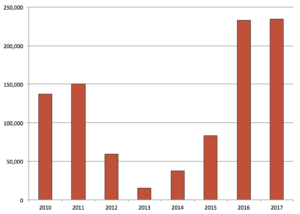Today I’m a daily writer. Even on sick days or very busy days I make sure to write at least 150 words. This is my third year of this schedule and it’s still working for me. There are days when it’s tough, and days when I write my 150 words and then erase them. There are days when I write in 10-minute bursts throughout the day or have to force myself to sit down and spend time writing something. But every day I write is a day when I don’t forget how to write.
That wasn’t the case for me in 2012.
In September of 2012 I started treatment for situational depression. Over the previous year I had lost the ability to feel emotions, to care for myself, and to pay attention to conversations, but the loss that hurt the most was related to writing.
 I tried many times during 2012 and 2013 to sit down and write. Every time was an exercise in self-hate and improving my ability to berate myself. I went from writing 150,000 words in 2011 to 60,000 words in 2012 to 15,000 words in 2013. It was a clear—trackable—symptom of my depression, and one of the most frustrating ones.
I tried many times during 2012 and 2013 to sit down and write. Every time was an exercise in self-hate and improving my ability to berate myself. I went from writing 150,000 words in 2011 to 60,000 words in 2012 to 15,000 words in 2013. It was a clear—trackable—symptom of my depression, and one of the most frustrating ones.
Before I was depressed, writing was easy and I took it for granted. I would listen to a song, read an article, have a silly conversation with a friend, and—BAM—there I went, fingers flying across the keyboard, 2,000 words plopped out in an hour or so. There were days when I would write 5,000 or 6,000 words. Words were easy and plentiful. I didn’t understand how someone could be completely blocked. Writer’s block was an easy obstacle for me to overcome. If one idea was giving me trouble, I’d jump to another. Being unable to write? When I wanted to? Not me.
While I was depressed, even if I decided to come to the writing watering hole, I could not get my horse to drink. The times I tried to write, I would sit and stare at a blank page. I might ask a friend for a prompt, mull it over, struggle over 200 words, and then delete all of them. Between January 2013 and October 2013 I wrote on a total of 9 days. In November and December, after I’d decided to apply to an MFA program and was starting to feel better, I kicked into “high-gear” and wrote 10 days out of those two months. I wrote 19 days total in 2013 and now in 2018 I’m currently on a run of having written 942 consecutive days. That’s—obviously—a huge change.
Writing was not something that automatically came back after I started feeling better. I struggled in 2014, even after I started UCF’s MFA program. (Let me tell you, starting a writing intensive program while you’re still recovering from depression? Not recommended.) This time when I forced myself to write, I had a different attitude about it. I shut down the negative thinking and pushed forward, continuing to plunk down words. It wasn’t the best writing—oh boy, adverbs ahoy and the longest dialogue tags you ever did see—but it was writing. And it got easier the more I pushed myself to practice and the more I forced myself to keep what I wrote.
Part of the reason I applied for the MFA program was because I knew it would provide structure that would force me to write. With grades as a motivator, I knew I could propel myself to get past the hump and write something because I couldn’t turn in a blank page. I feared all my writing might be crap. I feared the depression might have stripped away whatever talent I may have started with. I feared I was forever changed. But I knew that an MFA program was going to force me to confront those things and either figure out how to write again or discover I was done.
In the Spring semester, the start of 2015, I felt something come alive again. I revisited some crazy prompts I’d seen in the last year. I wrote about sentient robots in an alternate history World War II and about a house that possesses a girl. I wrote short assignments that explored my divorce and reconnected with characters created pre-depression. I started working on my novel in earnest. By the end of 2015, I had written 83,000 words and I was invested in my stories again.
Do I still love what I wrote then? Not really. But it gave me a foundation for stories and, most importantly, for my confidence. In 2016 when I realized I had written every day the first week of the year, it was an easy decision to continue writing every day until the end of the month, and then the next month, and the next. I made daily writing part of my routine, and that routine has helped me get through grief-related depression and anxiety. Since 2016 I’ve written over a half million words. I’ve come a long way.
In my experience, there was no writing with depression, not really. There was writing while fighting to not be depressed. There was writing for recovery, writing to unload negative feelings and trying to find something positive. There was struggling to write and hating myself and trying not to hate myself. There were moments when I was me again and when I could find joy and when it felt like I might be out of the woods. There was writing after depression.
Writing after depression hasn’t been all happily ever after. There are still days when writing is a struggle, when depression rears its ugly head, when life doles out extra helpings of anxiety and grief. On those days I set a timer for 10 minutes and I peck out 100 words. Then I set another timer and peck out 100 more. I check in with myself and ask, “Are you done? Do you have anything else in you?” Most days I do. Most days I can hit 500 words, but some days I can’t and I have learned to say, “That’s okay. This is enough.”


